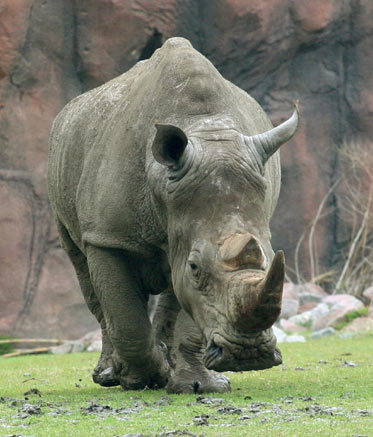Life and Leisure
S. Africa's horn of plenty under threat of poaching
By Clare Byrne (China Daily)
Updated: 2010-10-05 08:46
 |
Large Medium Small |
|
 Demand for rhino horn in Asia has led to a spike in poaching in South Africa. [Tuweimei / For China Daily] |
On a farm in South Africa's Limpopo Province a group of 10 recruits in green uniforms are being put through their paces.
"Open order, march!" Staff Sergeant Boy John Mashabane barks at his men as they goose-step across a patch of veld.
Before the drill, Corporal Hassan Mboweni, 34, tells how, growing up in a village in the northeast of the country, he always wanted to be a soldier.
"It was just my dream," he says.
But this is not the South African Defence Force.
Mashabane and his men are employees of Nkwe Wildlife Security Services, a paramilitary-style rhino protection company.
Over the past two years, South Africans have watched in horror as three decades of painstaking work to rebuild the country's rhino population from a few hundred in the 1950s to around 21,000 today are jeopardized by a spike in poaching driven by demand in Asia for rhino horn.
Despite having no proven medicinal value, the horn is widely used in traditional medicine in China, Vietnam and other countries.
"If you gave me a whole army you could stop this thing," says Jack Greeff, a former military special forces commander turned anti-poaching specialist and business partner of Simon Rood, founder of Nkwe Security.
From a few dozen rhinos poached each year in the early 2000, the numbers have escalated to 122 in 2009 and more than 200 so far in 2010.
Kruger National Park, the country's biggest tourist destination, has been worst-hit, but as the park boosts its patrols, poachers are now seeking other, softer targets.
In a recent weekend, four rhinos were found with their horns sawn off in Pilanesberg National Park in North-West Province. A fifth rhino, which was found alive, but injured and with its horns removed, later died of its gunshot wounds.
"It's a terrible sight," says Riaan Kotze, general manager of the Inkwe Valley Game Lodge, inhaling deeply on a cigarette.
"I've seen many rhino poached and I never got used to it," says the father of two, who dreamed of a "rustige (peaceful) life on the farm" when he moved to Limpopo and now rides around in a jeep, armed to the teeth with a pistol, hunting rifle and knife.
Since November, the five-star tourism and hunting lodge situated in the Waterberg area of Limpopo has lost five rhinos to poachers at a cost of around 4 million rand (more than $500,000).
The last two animals to get it in the neck here were a mother and baby. Their rotting carcasses were discovered two weeks later.
With rhino horn fetching around $15,000 per kg, Greeff and Rood say the only way to end poaching is to beef up security.
Nkwe places armed scouts on farms and reserves to carry out visible patrols and undercover anti-poaching operations. In three years it has never lost a rhino.
But many rhino owners still balk at hiring private security.
They're putting their faith in community watch schemes and the police, who recently arrested 11 people in the Waterberg area, including two vets, a game farmer and a hunter, on suspicion of running a poaching syndicate.
The police are also starting to make some inroads on the smuggling front. In June, a Vietnamese man was jailed for 10 years after being caught trying to smuggle seven rhino horns out of the country through Johannesburg airport. In the same month, on the opening night of the World Cup, three Vietnamese nationals were caught at the airport in possession of 18 horns.
But the country's rhinos are still not out of the woods. South Africa's conservation efforts have depended largely on the buy-in of private rhino breeders.
With poaching driving down prices for rhino, the private sector is starting to back away from the beasts.
There are more draconian deterrents - such as dehorning the rhinos.
"But who wants to come from Europe and see a rhino without a horn," Kotze wonders.
Others have begun investigating the possibility of poisoning the horns in a way that would contaminate the poachers but not the rhinos.
Ultimately, the solution, experts say, is to kill demand for rhino horn in Asia.
"It's a tradition thing," says Faan Coetzee, head of the Rhino Security Project at the Endangered Wildlife Trust. "That will take time and generations to change, but we need to work on that."
German Press Agency